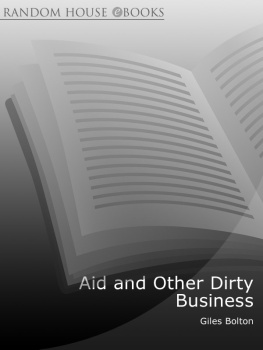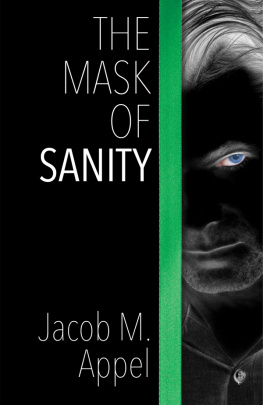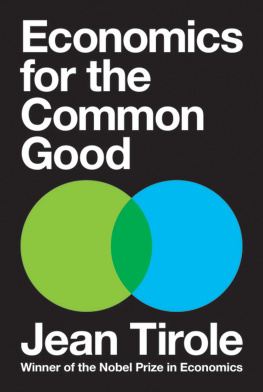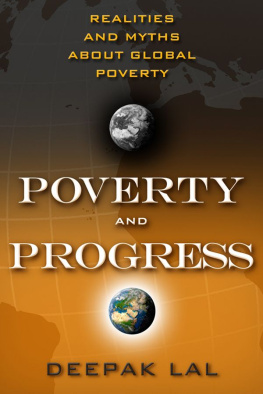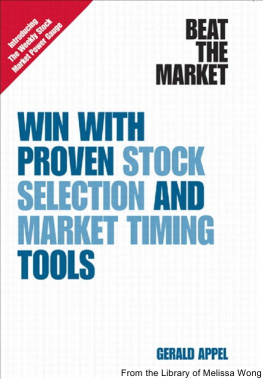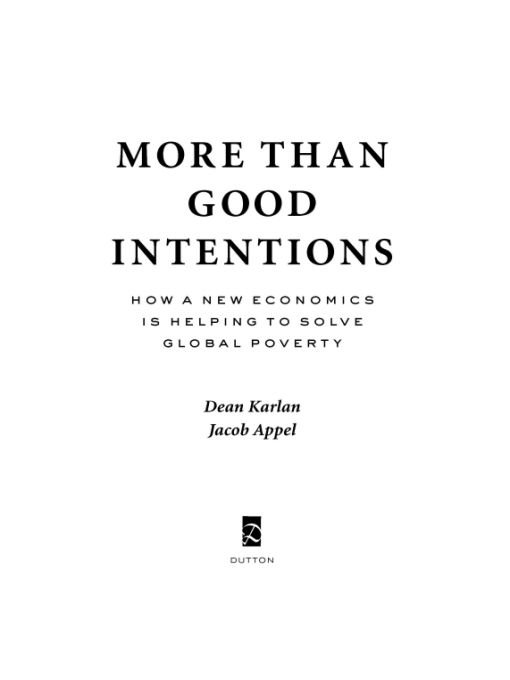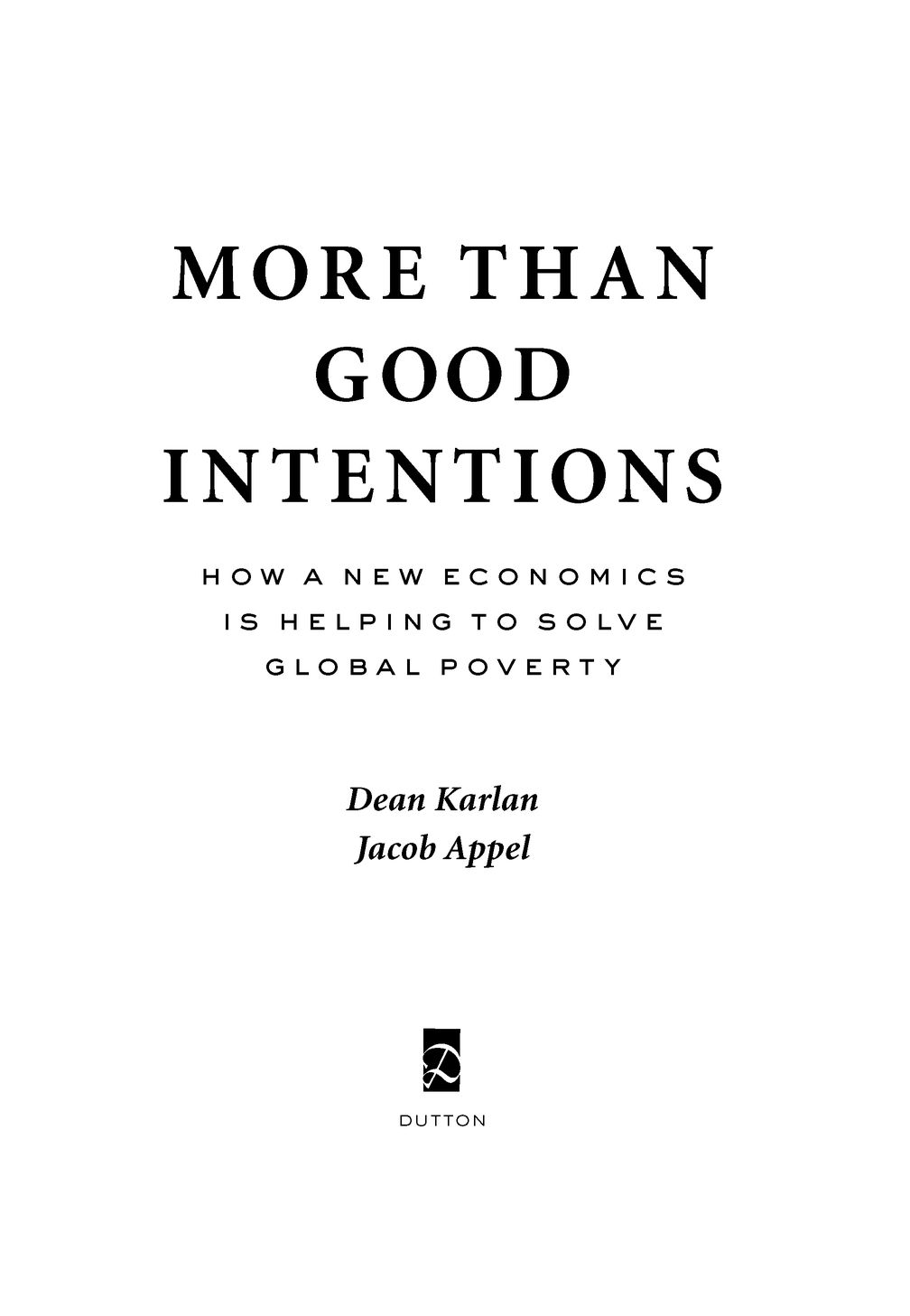Table of Contents
PRAISE FOR
More Than Good Intentions
Stimulating, breezy, intellectual; this book has it all. Once I picked up this masterpiece, I found myself opening up a birthday present every time I turned the page. A must read for anyone serious about the most important problems facing humanity today.
John A. List, Homer J. Livingstone Professor of Economics,
University of Chicago
This book wraps a world-changing idea in an immensely readable narrative. If we are going to overcome global poverty, we need more than good intentions, and Dean Karlan and Jacob Appel show us exactly what we need and how to get there.
Peter Singer, Ira W. Decamp Professor of Bioethics
in the University Center for Human Values, Princeton University
An accessible account of the new development economics based on field experiments and randomized control trials.... Valuable, insightful.... Anyone interested in a readable discussion of this truly new approach to poverty should pick up this book.
Tyler Cowen, professor of economics, George Mason University;
author of The Age of the Infovore and coauthor of the blog
marginalrevolution.com
The most urgent challenge in the world is economic development, and Karlan is right at its cutting edge.... An important bookand a captivating one.
Tim Harford, author of The Undercover Economist and
the Dear Economist column at Financial Times
The types of research that Dean Karlan and his colleagues at Innovations for Poverty Action conduct are critical for helping foundations like the Ford Foundation.
Frank DeGiovanni, director of economic development,
Ford Foundation; former chair of the executive committee,
Consultative Group to Assist the Poor
Karlan is one of the worlds leading experts on microfinance in developing countries, and hes done pioneering research around the globe. His work smashes old boundaries within economics to answer some of the most pressing issues facing poor countries today. Most of what we know today about how to make microfinance work for the poor flows from Deans research.
Edward Miguel, professor of economics,
University of California, Berkeley
More Than Good Intentions offers a new way forward in the battle against poverty. Its a data-driven path, but one populated with real-life stories and full of the human spirit. Karlan and Appel call us to be rigorous in our decisionsand we need to listen to them, for the stakes couldnt be higher.
Jacob Harold, program officer, philanthropy,
The William and Flora Hewlett Foundation
This wonderful book, by one of the leading combatants, brings us directly to front lines of the battle for a more reasoned approach to fighting poverty.
Abhijit Banerjee, the Ford Foundation
International Professor of Economics at MIT
This book invites you to a conversation. The topic could not be more compelling: global poverty. Your partner could not be more fascinating: one of the leading scholars in the world working on it. The result is everything you would hope for.
Sendhil Mullainathan, professor of economics, Harvard University
Be prepared to have your preconceptions about international development sharply challenged, as Karlan and Appel break down what really works to alleviate poverty.
Justin Oliver, executive director, Center for Microfinance,
Chennai, India
Karlan offers that all-too-rare combination of academic research excellence and its application to international development practice. Karlan is creating a breakthrough.
Chris Dunford, president of Freedom from Hunger
Karlan and Appel write that their goal is to speak directly to readers, to lead them into some corners of the world they might not otherwise encounter, and bring them face-to-face with the people who populate those places. They have succeeded admirably, as both advocates and analysts.
Kirkus
Engaging prosevivid reportagean enlightening and optimistic take on smartening up development aid.
Publishers Weekly
Dean: To Cindy, for all of your love and support.
And to Maya, Max, and Gabi, in random order.
Jake: To Poppop and Grandpa
AUTHORS NOTE
How Jake and I Met, and the Voice in This Book
How Jake and I Met
In late 2006, I got an automated e-mail alert from Google informing me that Innovations for Poverty Action, the name of the nonprofit organization I founded, had appeared on a Web page. I clicked the link and found myself reading a blog entry by Jacob Appel, then a recent hire who was working on one of our projects in Ghana. The next thing I knew, an hour had passed and I had read through the entire thingwhich is extraordinary for someone with the attention span of a cornflake.
I knew JakeI had interviewed him a few months before and had been working with him on two different projectsbut I didnt know he was a writer. Id hired him on the strength of his math background, and in his interview he struck me as a fellow numbers geek. But through his blog I learned that Jake is a sponge. He is the type of guy who doesnt just go to the market and buy his groceries. He talks to the taxi driver on the way to the market and learns about his life. At the market he asks about business, how it is going, why the entrepreneur is doing what she is doing. He soaks up the world around him, and squeezes it out in gripping stories about daily life. And he writes wonderfully, in contrast to the boring, technical writing called for in academia. A team was born.
This book was a project I had had in mind for a long time. I really wanted to create a bridge between the wonky, specialized world of economic development and the wider world of people who care about and engage with the issues of poverty, but not necessarily as a full-time job. Much of the research my colleagues and I do ends up languishing in technical journals and is discussed mainly at conferences of academics, development professionals, and large foundations. To the extent that the public is aware of it at all, most have the impression that its dense, dull, and dry stuff.
In truth, its anything but. As anyone who has spent time doing research in the field will attest, it is engaging, thought-provoking, and inspiring work. Reading Jakes blog, I knew that he could communicate that, both through his accounts of interactions with everyday people and through writing about the research itself. So, as his project in Ghana was winding down, I approached him about working together on a book. It was a pretty attractive offer, all things considered. I was fairly jealous: travel the globe, visit projects, read current research, and write. Happily, he accepted. I did get to travel some with him too. Although the discovery of Scrabble on the iPod touch did not help our productivity when visiting sites or on our writing retreats together, it undoubtedly added to the fun. Eighteen months and many thousands of miles later, here we are.
The Voice in This Book
Above all, the goal was to make this book accessible and engaging, for it to speak directly to readers, to lead them into some corners of the world they might not otherwise encounter, and to bring them face-to-face with the people who populate those places. The last thing I wanted was for readers to get hung up on the authors, confused about whose voice they were hearing.


